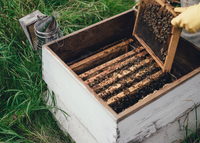If you’ve wanted to keep bees but thought this privilege was reserved for country folks, think again
Urban beekeeping has made a comeback—and it’s not only good for human food production, it’s also great for bees. With colony collapse disorder taking a huge toll on bee populations, you can support these pollinators by giving them a new, thriving home while also helping the ecosystem.
Why keep bees in the city?
Bees are one of the most important insects on the planet, not only for their delicious contribution of honey, but also for providing us with an abundance of other foods. In fact, our entire food system relies on pollinators. However, in that same industrial food system, the use of pesticides and herbicides to kill pests has also harmed bees.
Keeping and protecting bees in the city helps keep them close to parks and community gardens where there is food and flowers for them to forage on, while also keeping them away from mass pesticide use in agricultural areas.
An added bonus of keeping bees near your home is that if you have a garden, they’ll go hand in hand. If you’ve noticed local pollinators are lacking in your yard, keeping some bees may be the difference between an average yield and a great one. And let’s not forget about the nutritional value and taste of natural honey, plus the relaxing benefits of caring for an entire colony.
Just like you would do your homework before caring for any animal, it's important to do extensive research before keeping bees.
 Photo by Annie Spratt on UnsplashThings to consider and do before keeping bees
Photo by Annie Spratt on UnsplashThings to consider and do before keeping bees
- Check the zoning regulations to see if bees are permitted where you live.
- Do you have at least a tenth of an acre (backyard) or more? If so, you can accommodate one or two colonies. If not, you may want to see if your community garden or rooftop plot will allow for beekeeping.
- Are you allergic to bees? You may want to check with your doctor first.
- Check with your neighbours and make sure they’re OK with it. Explain the benefits and maybe even invite them on the journey.
- Make sure the bees have access to food. You can plant native and non-native flowers and plants strategically to ensure they’re sustained. Also, bees tend to travel up to 9 km to locate nectar and pollen, so take a walk and see what’s within 9 km of your home.
- Find a spot to keep your bees and consider all of their needs and safety. Kim Flottum’s article—and book—are very useful when wanting to learn everything there is to know about being a backyard beekeeper.
How to care for bees
- Learn how to best set up your hive where you can help maintain the colony and easily harvest the honey, but still mimic their natural ways.
- Gather your supplies, including your protective gear and a smoker to help distract bees.
- Choose your honeybees (preferably docile ones to start), study their type, and learn how they make honey. You can never know too much before diving in.
- Build a hedge of plants to block the beehive. This can be sunflowers, or the hive can be behind a building. This helps with bees flying up and away when leaving their hive, and then returning from above, so they aren’t flying at human height.
- Make sure there’s water near the hive so that the bees don’t have to go far or go to an “inconvenient for you” location to find it.
- Learn about your tasks divided by the season. It’s best to start in the spring, so you have some time to research and think. Starting in spring allows your colony to build up, lay their babies, increase in number, and store the honey before the winter sets in.
If you want to keep bees but want a trial run first, connect with your local beekeeping organization. For one, it’s great to meet knowledgeable folks in the area who can answer your questions, but they also may let you borrow a hive to see if it’s a good fit. Otherwise, you can also just volunteer to help with their colonies, rent bees at a location, or start a forum or community to split the tasks. The options are endless, and the bees (and plants) will appreciate the effort no matter which route you choose.

